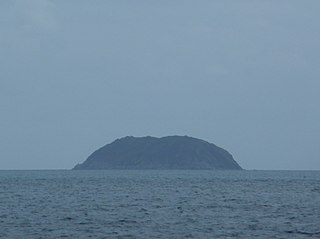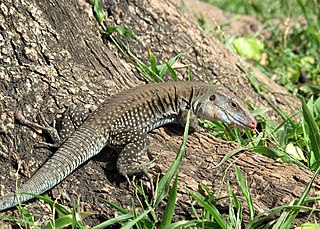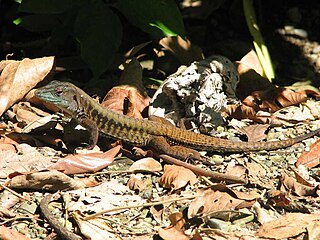
Citrus is a genus of flowering trees and shrubs in the rue family, Rutaceae. Plants in the genus produce citrus fruits, including important crops such as oranges, lemons, grapefruits, pomelos, and limes. The genus Citrus is native to South Asia, East Asia, Southeast Asia, Melanesia, and Australia. Various citrus species have been used and domesticated by indigenous cultures in these areas since ancient times. From there its cultivation spread into Micronesia and Polynesia by the Austronesian expansion ; and to the Middle East and the Mediterranean via the incense trade route, and onwards to Europe and the Americas.

Ameiva, commonly called jungle-runners, is a genus of whiptail lizards that belongs to the family Teiidae.

Ameiva ameiva, also known as the giant ameiva, green ameiva, South American ground lizard, or Amazon racerunner, is a species of lizard in the family Teiidae found in Central, South America, and some Caribbean Islands.
There are three species of lizard named giant ameiva:

Little Camanoe is an uninhabited island of the British Virgin Islands in the Caribbean.

Prickly Pear is an uninhabited island of the British Virgin Islands in the Caribbean. Even though the island doesn't have permanent residents, it has a beach bar and recreational water sports facility on it. It is located on the north side of North Sound, opposite Virgin Gorda.

Round Rock is an uninhabited island in the British Virgin Islands, to the south of Virgin Gorda, east of Ginger Island and close to Fallen Jerusalem Island.

The guppy, also known as millionfish and rainbow fish, is one of the world's most widely distributed tropical fish and one of the most popular freshwater aquarium fish species. It is a member of the family Poeciliidae and, like almost all American members of the family, is live-bearing. Guppies originate from northeast South America, but have been introduced to many environments and are now found all over the world. They are highly adaptable and thrive in many different environmental and ecological conditions. Male guppies, which are smaller than females, have ornamental caudal and dorsal fins. Wild guppies generally feed on a variety of food sources, including benthic algae and aquatic insect larvae. Guppies are used as a model organism in the fields of ecology, evolution, and behavioural studies.
Pholidoscelis maynardi, commonly known as the Great Inagua ameiva, Inagua ameiva, or Inagua blue-tailed lizard, is species of lizard, a member of the family Teiidae. The species is endemic to the Bahamas. Three subspecies have been described.

The common Puerto Rican ameiva or Puerto Rican ground lizard is a species of lizard in the whiptail family.

Holcosus festivus, commonly known as the Central American whiptail, the Middle American ameiva, and the tiger ameiva, is a species of lizard in the family Teiidae. The species is native to Central America and northern South America.

Holcosus leptophrys, also known commonly as the delicate ameiva and the delicate whiptail, is a species of lizard in the family Teiidae. The species is native to Central America and northwestern South America.

The Dominican ground lizard or Dominican ameiva is a species of lizard. It is endemic to the Caribbean island of Dominica, an island noted for its intact and abundant reptile population, where it is most commonly found in dry coastal woodland.
Censky's ameiva, also known as the Little Scrub Island ground lizard, is a species of lizard in the family Teiidae. It is indigenous to the Caribbean.

Pholidoscelis plei, known commonly as the Anguilla Bank ameiva or the Caribbean ameiva, is a species of lizard in the family Teiidae. The species is found on the Caribbean islands of Anguilla, Saint Martin, and Saint Barthélemy in the Lesser Antilles. Its coloration and markings vary between each island population. Two subspecies are recognized as being valid, including the nominotypical subspecies.
The Montserrat ameiva is a lizard species in the genus Pholidoscelis. It is found on the Caribbean island of Montserrat in the Lesser Antilles.
Plasmodium carmelinoi is a parasite of the genus Plasmodium.

Pholidoscelis is a genus of lizards that belongs to the family Teiidae.










